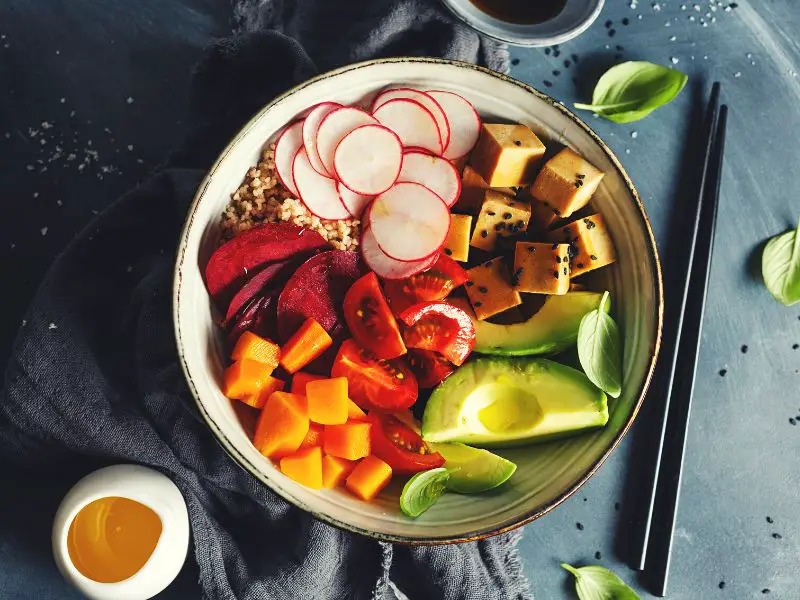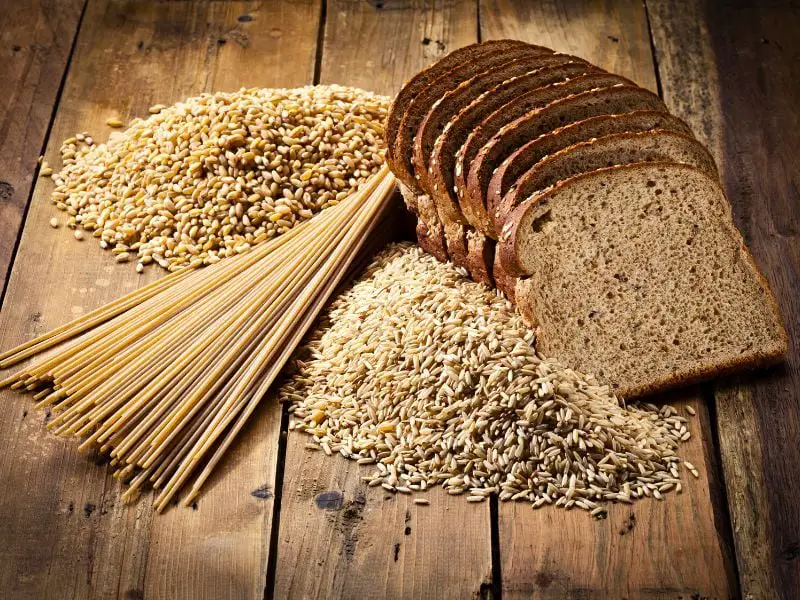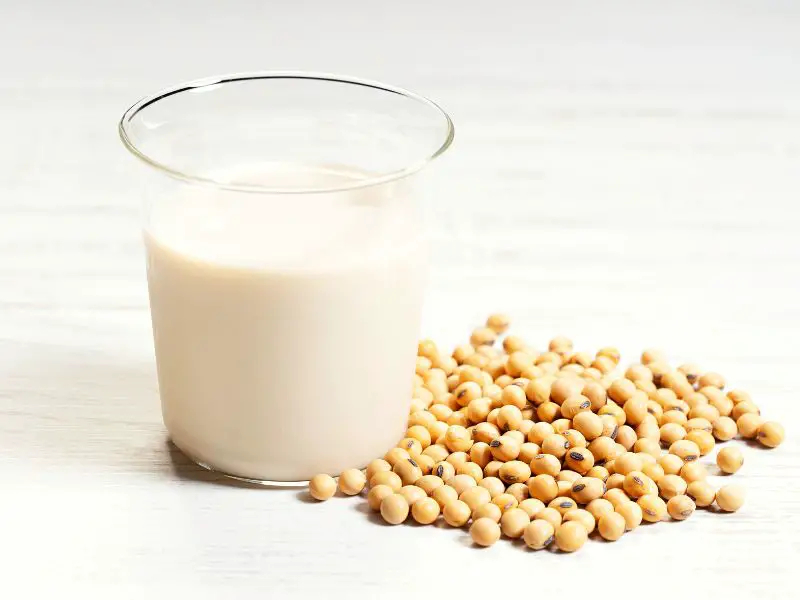Some people wonder what do vegans eat. The word vegan means a person who doesn’t use or consume anything from an animal, including food (meat, milk, eggs, etc.), clothing (wool, leather), or any other products that come from animals. To identify as a vegan is to avoid using primary sources of animal-based goods and services for health or empathy for the animals themselves.
In this article, we’ll discuss what veganism is, what do vegans eat, and what vegans avoid. Let’s go!

What Is Vegan Food?
Vegan cuisine avoids all animal products, including meat, fish, dairy, eggs, and honey. It may sound like a drastically different way of eating, but what vegans eat has many similarities to the meals of those who consume meat. There’s a vegan alternative to all-time favorites – vegan pizza, vegan tacos, vegan ice cream, etc.
“Vegan food is not just about what you can’t eat, it’s about discovering a whole new world of delicious and nutritious plant-based options.”
– The Vegan Society
And when you consider the abundance of fruits, vegetables, legumes, nuts, salads, herbs, and spices, it’s simple to understand why so many new vegans find there is nothing to miss with their new diets.
What Is a Vegan Diet?
You may be asking why vegans stop consuming dairy and eggs. People always assume that dairy (milk, cheese, etc.) and egg-producing animals are handled humanely; this is not simply the case most times.
The dairy sector is as vicious as the meat industry. Many newborn calves are separated from their mothers after just a few days and placed in veal cages, severely restricting their movement. They are fed a nutrient-restricted diet before being slaughtered for meat. Their mothers, if they’re in a highly productive industrial facility, share a similar fate after being used for milk for less than three years.
And what about the eggs? The egg business is also revolting in its own way. Even on so-called “free-range” farms, many consumers are misled into believing that their eggs come from “happy hens,” yet this could not be farther from the truth.
Although chickens may live for more than a decade, they are often slaughtered after just two years when their bodies are too exhausted to continue laying eggs.
Flavors and Ethics
When one explores the colorful and enriching sphere of what do vegans eat, a diverse range of plant-based foods and dishes paint the culinary canvas. This lifestyle, largely associated with what do vegans eat, is gaining momentum, driven by a conscientious vegan society and a strong inclination toward healthy eating.
The assortment of vegan food offers a symphony of flavors, from the hearty goodness of black beans to the contemporary culinary creation of the impossible burger, demonstrating a vast and lively culinary scope.
The Nutrient-Rich Landscape
Embarking on a journey into what do vegans eat means a deliberate movement away from animal foods and products, focusing instead on a nutrient-rich array of plant foods. To get a better grasp of what do vegans eat, one needs to understand the importance of integrating vital nutrients like vitamin B12 and vitamin D through fortified foods or supplements, ensuring a well-rounded and nourishing diet.
The vegan way of life is not just about enjoying a plethora of health benefits but also a reflection of a commitment to ethical and environmental sustainability. Choosing to eat vegan means omitting animal proteins and saturated fats, opting instead for healthy fats found in foods like avocados, nuts, and seeds, essential for cognitive and overall health.
Culinary Creativity and Diversity
When diving into the creative world of what do vegans eat, it’s evident that vegan recipes are a kaleidoscope of innovative and diverse plant-based foods, creating dishes that are as flavorful as they are nutritious. Exploring what do vegans eat unveils how a basic ingredient like black bean can be transformed into a myriad of delicious dishes, and how staples like nutritional yeast add a comforting flavor to a multitude of vegan meals.
“The beauty of food lies in its diversity, and the creativity we bring to it.”
– Yotam Ottolenghi
Striving for Balanced Choices
While exploring what do vegans eat, maintaining a balance by avoiding excessive processed food is crucial. It’s important to combine fresh, wholesome plant-based food with the convenience of processed options judiciously. Resources like the Eatwell Guide are invaluable in navigating what do vegans eat, offering practical advice and insights into maintaining a balanced and nutritious diet.
Embracing a Lifestyle Shift with Vegan Diets
Going vegan is more than a mere dietary preference; it’s a transformative lifestyle that redefines traditions and dietary habits. The increase in the availability of plant-based options, from supermarkets to restaurants, demonstrates the mainstream acceptance and growing preference for what do vegans eat, reflecting a significant shift in consumer behavior and ethical consumption norms.
The Pivotal Role of Vegan Society
The vegan society has been instrumental in transitioning veganism from a niche lifestyle to a mainstream choice, emphasizing the ethical, environmental, and health benefits of what do vegans eat. This shift towards a plant-based diet represents a lasting change, continually evolving and gaining momentum with the consistent efforts of advocates and increasing awareness among the public.
“The Vegan Society has been a beacon of hope for millions of people around the world who believe in a kinder, more sustainable future.”
– Gary L. Francione
What Do Vegans Eat?
1. Bread, Rice, and Pasta

When we refer to grains, we do not only mean grains! We refer to all grain-based items, including bread, pasta, and baked goods like bagels, pretzels, cakes, and cookies. In addition to Basmati, white, brown, black, arborio, and wild rice, we also have access to millet and quinoa, orzo and amaranth, buckwheat, oats, maize, freekeh, and other grains. They can be consumed as-is, included in breakfasts or risottos, stuffed with roasted veggies, or contained in burritos.
2. Dairy Alternatives

Milk, butter, cheese, yogurt, and other items made from cow’s milk can be replaced with various alternatives. Soy products like soymilk, tofu, and tempeh are the most popular alternative to cow’s milk. However, almond, oat, hemp milk, or coconut drinks are equally popular among vegans. Milk alternatives come in various flavors, including plain unsweetened versions used in cereal or coffee.
Oat, soy, hemp, rice, almond, or cashew milk are other options available to vegans. They are also allowed to eat dairy products such as yogurt, cream, cheesecakes, and ice cream made with soy, coconut, or cashews. Even sour cream, whipped cream, and cream cheese are all available. As a vegan, you won’t be missing out on anything!
3. Fruits and Vegetables
These include fruits, vegetables, herbs, spices, and nuts. There are thousands of varieties of fruits and vegetables that vegans can eat. Some of the most popular foods consumed by vegans are fresh produce such as tomatoes, potatoes, carrots, apples, pears, cucumbers, and more.
New vegans are encouraged to increase their eating options and seek out products they have never tasted before. They could try okra, samphire, kohlrabi, or celeriac. Custard apples, dragon fruit, horned melons, and persimmons are possibilities. Don’t forget about the dry and canned options, which may be cost-effective and handy for a meal.
4. Legumes
Also known as pulses, legumes are an essential part of a vegan diet; They include beans, peas, and other varieties of soy. Beans are a good source of protein for vegans and non-vegans alike. The range is vast, from black beans and kidney beans to butter beans and fava beans. The dry types can be stored for years and do not require refrigeration.
Other legumes include lentils, which come in many colors like black and red. Some supermarkets sell them pre-cooked in cans or pre-soaked to speed the cooking process along.

5. Nuts and Seeds
Nuts and seeds are beautiful additions to various cuisines and recipes due to the abundance of beneficial fats and proteins.
Nuts
Vegans need nuts. They are a source of healthy fats that help absorb Vitamin C from fruits and vegetables. Put them into breakfast for crispness and vitality.
You can also get protein from nuts and use them to make delicious nut butter or vegan cheese. The most popular and important nuts to consider if you plan to become a vegan or at least to replace some of the protein you usually consume in meats are:
- Almonds
- Brazil nuts
- Cashews
- Hazelnuts
- Macadamia nuts
- Pecans
- Pistachios
- Walnuts
Seeds
Although seeds are pretty small, they are surprisingly healthy. Seeds such as flax and chia contain omega 3, which is an essential fatty acid for the proper functioning of our brains and hearts. Take your salads and smoothies to the next level by topping your bowl with a spoonful of these seeds:
- Chia seeds
- Pumpkin seed
- Season seed
- Sunflower seed
- Hemp seed
- Poppyseed

What Vegans Don’t Eat
There is an incredible richness of plant-based foods that we can include in our diets, and these may easily displace or replace meaty foods. Including…
1. Goat, Lamb, Mutton, Beef, Pork, and All Red Meats
This should come as no surprise. Vegans do not eat any form of red meat. Unfortunately, the meat industry does many terrible things to animals on a daily basis. For starters, cows are forcibly impregnated every year, and their male calves are slaughtered after just months of age. And what about veal calves raised (forcefully) for meat? According to vegan and animal rights advocates, the practice of raising them for meat is just as inhumane as slaughtering them at birth.
2. Turkey, Chicken, Ducks, and Other Poultry
Poultry does not belong in any vegan diet. In addition to their slaughter and the fact that they are fed antibiotics, their eggs are often treated with chemicals to make them profitable. They are also often subjected to the same or sometimes even more gruesome practices as pigs and cows.
3. Fish, Shellfish, and Other Marine Life
Fish are animals as well, so vegans who want the flavor of the sea but don’t want to participate in the trawling that is destroying the oceans can get it from seaweed or faux fish products such as vegan imitations.
4. Honey
Honey is not a choice for most vegans. Bees are animals, and vegans don’t consume products from or derived from any kind of animal. With insects playing an essential role in preserving the environment, many researchers and scientists think that a reduction of pollinators signals doom for the ecosystem.
According to Professor Johanna Brunet, without them, a variety of fruits and vegetables would be unable to thrive. ‘Humans rely on plants, and plants rely on pollinators.’ ‘To preserve life on Earth and ensure human survival and health, a balance must be maintained,’ she argues.
Frequently Asked Questions (FAQs)
Author’s Note
The vegan diet allows for an incredibly healthy way of living and is one of the most beneficial ways to eat. While the primary focus of this diet is animal welfare, it also has huge positive effects on human health. Healthier eating choices such as a vegan diet can improve your body’s ability to deal with health-related illnesses and diseases.
Overall, the evidence for the effectiveness of a vegan diet in improving health is mixed, with some studies showing that eating more plant foods and less meat can prolong life and prevent chronic illnesses. On the flip side, some research show that people who said they ate a lot of fruits, vegetables, soy protein, and fiber were at higher risk of lacking essential nutrients than other groups.
Making the switch to veganism? You’ll love these Fun and Quirky Gifts for Vegans, Vegan Leather Boots and Vegan Belts.



;?>/smartquizbuilder/includes/images/sqb-registration-img.jpg)



2 thoughts on “Vegan Diet Guide: What Do Vegans Eat and What They Don’t”